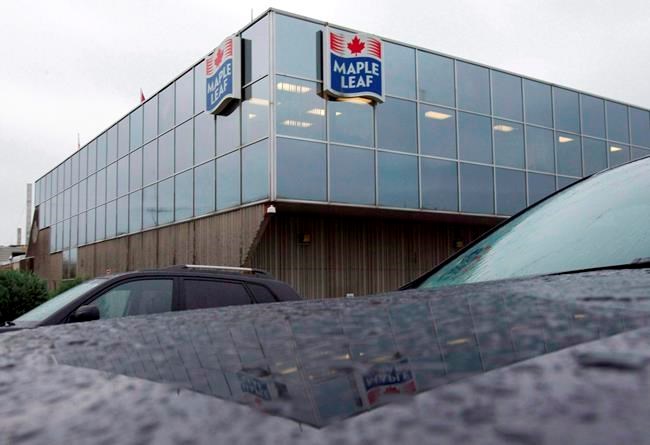Maple Leaf Foods Inc. says increased expenses tied to the COVID-19 pandemic will drain up to $20 million from its income statement in the second quarter as it struggles to cope with market shifts, public health restrictions and plant shutdowns following infections at several sites.
The higher costs include extra spending on labour — including a weekly $80 bonus to hourly staff — personal protective equipment, sanitation and screening, the company said.
“Unfortunately, we have identified some cases of COVID-19 among front-line team members that work in our processing facilities," CEO Michael McCain said during a conference call with analysts Wednesday.
The infections required the company to suspend operations "at a small number of facilities over the past several weeks for as little as 24 hours to about a week," he said.
Even with strict protocols in place at processing facilities, "there’s a certain sense of unpredictability going forward."
More broadly, McCain cited volatility triggered by the crisis as demand migrated to retail thanks to consumer "hoarding" and away from food service, where sharp declines began in mid-March.
While Maple Leaf derives about three-quarters of its business from retail, the shift toward it has nonetheless been highly disruptive as the company grapples with insufficient capacity to churn out some products for retail, he said.
Among the most popular items for home-bound Canadians and Americans are wieners, sausages and bacon, while deli meat sales have dipped with the shutdown of restaurants across the continent, McCain said. "Some categories like lunch kits tend to suffer with families at home."
Despite ongoing uncertainty, Maple Leaf maintained its earnings forecast for the year and said it expects its financial performance will be "largely unchanged."
The food producer cited a hunger for pork in China and Japan as well as continued demand for plant-based protein, even as it contends with unstable pork and poultry commodity markets, potential plant closures down the line and ongoing public health measures that have shuttered the restaurant industry.
Last quarter, sales of meat products rose by nearly 13 per cent year over year while plant protein sales jumped by more than 25 per cent. Driven by expanded distribution of new products and more volume for existing ones, sales of plant protein — which includes grain-based protein and vegan cheese products — still comprise less than five per cent of total sales.
Maple Leaf reported a first-quarter loss of $3.7 million or three cents per share compared with a profit of $50.1 million or 41 cents per share a year ago.
The loss came as it made strategic investments in plant protein and saw a $36.7-million impact to earnings from non-cash fair value changes in biological assets and derivative contracts driven by depressed market prices for hogs, the company said.
On an adjusted basis, operating earnings amounted to $45.1 million or 21 cents per share for the quarter ended March 31, up from $42.1 million or 20 cents per share in the same quarter a year earlier. Analysts had expected adjusted earnings of 16 cents per share, according to financial markets data firm Refinitiv.
Sales in the first three months of 2020 totalled $1.02 billion, up from $907.1 million in the first quarter of 2019.
This report by The Canadian Press was first published April 29, 2020.
Companies in this story: (TSX:MFI)
Christopher Reynolds, The Canadian Press




